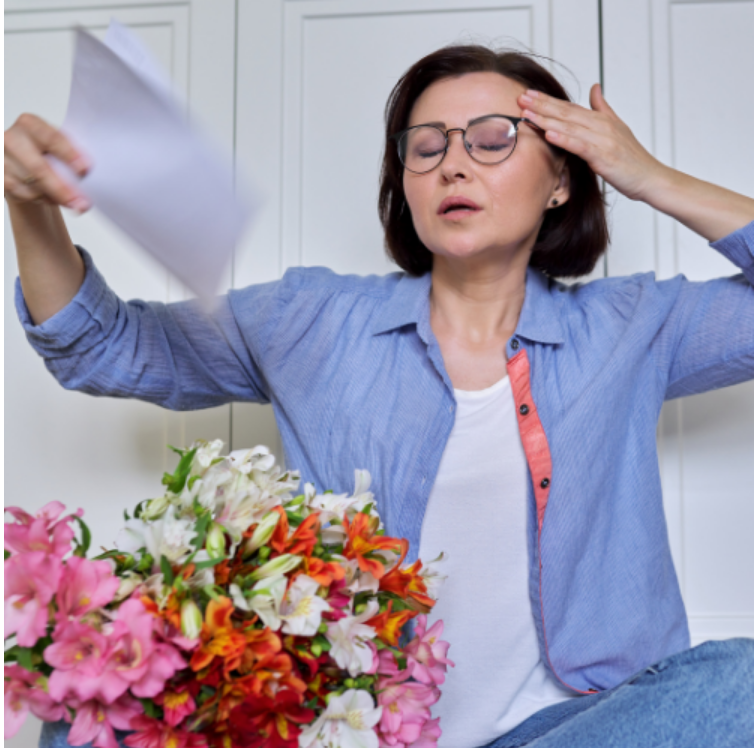Causes of Menopause
Menopause occurs in all women. It can occur when the ovaries spontaneously fail to produce the hormones oestrogen and progesterone, when the ovaries fail due to specific treatment such as chemotherapy or radiotherapy, or when the ovaries are removed, often at the time of a hysterectomy. The resulting low and changing levels of hormones, particularly oestrogen, are thought to be the cause of menopausal symptoms in many women.
Symptoms Of Menopause
The most common symptoms are:
- Physical Symptoms include: headaches, joint aches, palpitations, insomnia, night sweats, hot flushes
- Psychological Symptoms such as difficulty concentrating is related to hormonal changes, directly or indirectly, such as sleep disturbance; forgetfulness; difficulty coping ; anxiety, irritability, mood swings
- Sexual Problems may be caused by vaginal dryness due to low oestrogen levels, resulting in discomfort during intercourse.
- Other Symptoms include
- Passing urine more frequently by day & night and leakage of urine
- Skin may become dryer, thinner, less elastic & more prone to bruising
- Urine infection and vaginal dryness, discomfort, burning & itching
Long Term Effect of Menopause
The two most important long-tem effects of reduced estrogen levels involve the effects on the skeleton and the cardiovascular system.
1. Increased risk of osteoporosis
Loss of bone bulk and osteoporosis are natural features of ageing, but loss of estrogen accelerates the process in post-menopausal women. You can reduce your risk of osteoporosis by taking short, frequent sessions of weight-bearing exercise, eating plenty of calcium, giving up smoking and moderating alcohol consumption.
2. Cardiovascular Disease (CVD)
Cardiovascular Disease (CVD) is the leading cause of death in women after the menopause. As estrogen levels fall, the protective effect on the heart is lost and changes occur which can lead to an increased risk of heart disease. You can reduce your risk of CVD by maintaining a healthy weight and stopping smoking.
Why Acupuncture Helps?

For women who are undergoing the menopausal transition, it is believed that acupuncture can aid the body’s own adaptive changes to hormones and help relieve menopause symptoms. The central nervous system not only transmits signals along the nerves but also emits a variety of biochemicals that influence other cells of the body.
The nervous system, with over 30 peptides involved in transmitting signals, is connected to the hormonal system via the adrenal gland, and it makes connections to every cell and system of the body.
Needling the acupuncture points stimulates the nervous system to release chemicals in the muscles, spinal cord and brain. These chemicals will either relieve the symptoms of menopause or they will trigger the release of other chemicals and hormones which influences the body’s own internal regulating system..
How long will the treatment take?
The length, number and frequency of treatments will vary depending on the severity of the condition and how long you have had it. Typical treatment lasts 45 minutes, with the patient being treated twice a week.
Ten to twenty treatments per course are standard. Some symptoms are relieved after the first treatment, while more severe or chronic ailments often require multiple treatments.
Assisting Treatment
Acupressure (Chinese Medical Massage)
Every woman reacts differently to the bodily changes that occur during menopause. Some women manage with confidence, while others may be overwhelmed and less adept at controlling their emotions.
Whatever the case may be, massage can significantly reduce anxiety and pain and increase relaxation. It can help a woman cope with and manage menopausal discomfort with greater ease.
Chines Herbs
Herbs are used to treat menopause because they are believed to help regulate oestrogen levels, as well as to reduce the severity of common symptoms of menopause, including hot flushes. It helps to balance hormones and can help ward off depression and increase memories.
Cupping
Cupping affects the body’s tissue up to four inches deep. This causes tissue to release toxins, clears blockages, activates the lymphatic system and helps to clear the veins and arteries. Cupping is thought to be the best form of deep tissue massage available and is safe and reliable for most people.
Research & Evidence

From 1997 to 1999, in one of the first studies in the US to explore the effectiveness of acupuncture in alleviating hot flashes, insomnia and nervousness, conducted by Dr. Susan Cohen, D.S.N., APRN, it was found that during the course of acupuncture treatments, hot flashes, insomnia and nervousness significantly decreased in those receiving acupuncture, compared to those receiving routine care. A 2002 pilot study in England found that acupuncture reduced the frequency and severity of hot flashes in women being treated with tamoxifen for breast cancer.
“The results of the studies tend to indicate there is benefit in the use of acupuncture in the alleviation of menopausal symptoms, particularly hot flushes and anxiety”—British Acupuncture Council
“Acupuncture treatment regulates unstable hormone levels during menopause, helping with hot flushes, but it can also help with insomnia, headaches and migraines,”—Ms Jacqueline Brown clinical director of the UK Natural Health and Fertility Clinic
Book Online
Booking your experience with us is quick and easy! Simply select your preferred service, choose a date and time that works for you, and fill out the required information.
